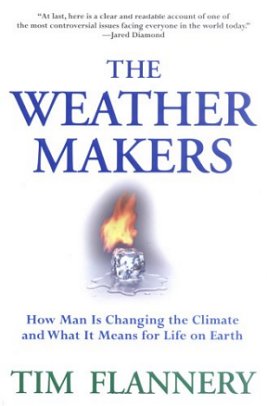

|
<<<<<< Continued from previous page
BOOKTHINK: I've just finished reading your latest book The Weather Makers, which, although you offer the reader hope and possible solutions, is an alarming wake-up call to all of us.

It is a straightforward and highly readable education on the earth's climate and what climate change holds in store for us. What alarms me most is the lack of focus on this issue by the media and seeming lack of concern by most of us as individuals. Scientists emphasize that we must act now. What is holding things back? FLANNERY: The lack of good information. That's why I wrote the book. Just to make sure the information got out there. But also, there's been a number of forces at work in Australia and in the U.S. that have really deliberately tried to mislead people. And it's been partly because our societies have done so well from fossil fuels. There's a lot of vested interest, and disinterested people can hardly think beyond it in some cases, and so they don't want to move forward. The same thing was done by the tobacco industry - to try to confuse people about the emerging bad news. It's a counterproductive thing to do. BOOKTHINK: Do you think people feel powerless in the barrage of challenges, perhaps, just throwing up their hands and saying, "We can't do anything"? FLANNERY: Maybe, but I think it's really important that we don't feel that way. Goodness. Never get mad, just get even - that's what makes the way forward. There's no point in wallowing in self-pity or hopelessness; we know we have to do something. And I'm really confident we will, once we understand. The decisions will be made in the next decade. There's no time to waste on this. The way forward is very clear. We know what we have to do. I was really shocked when I realized how far things had gone with climate change - how dire the situation was. You know, I was a trained scientist, and I still hadn't properly prioritized climate change. So if I hadn't, what's the chance that the average person had properly prioritized it? So it's important that we try to take all this science and make it intelligible to people. To me, what will move people is really a moral sense, that we know it's wrong to degrade our children's quality of life to enrich ourselves - and that's what we're doing really at the moment in this issue. It was the same sort of thing I suppose when the abolitionists realized that slavery was wrong because it degraded some people in order to enrich others. BOOKTHINK: That's a very good comparison. I never thought of that before, but what a hard time we had giving it up. FLANNERY: Imagine a world where whole colonies existed just because of the institution of slavery, and where shipping companies, and banks, and ruling classes were getting richer by the year on the back of this iniquitous institution. No one in the street was even thinking about it, I'm sure - the average bloke in the 18th century never gave it a second thought. And no one was really freeing the slaves because it would cost them too much. And yet somehow, it was forced to die, through pure force of moral argument. BOOKTHINK: Sometimes I think we've convinced a generation or two of people that consumption equates with happiness. We no longer build things that last. Instead of buying quality of craftsmanship, we have a throw-away society. How big a part does that play in the problem? FLANNERY: It's a huge part. Do you know, I think it's at different levels all around the world - we are all pretty consumerist. But the fundamentals of the way American society is put together make it even more consumerist than some other societies. And I don't want to be negative at all about Americans, because I love the place, and I have dear, close friends here. Even the medical system here - it seems to me that human health has turned into another means of consumption. When you see the ads on TV for different drugs and things - we just don't have any of that in Australia. We have sort of quarantined human health - we've socialized it, so we all pay for it through our taxes and therefore there's no advertising for it. It's been taken out of the capitalist system to some extent. The free market is very important to us in the way we live; there's no doubt about that. But we have to somehow insulate a few parts of our society from that, and health care is very good one. And many countries around the world have socialized it for that reason. If you put money too much at the sacred, if it becomes too important to you, other means of exchange diminish. So you don't have the social means because money is only one way of exchanging things between people. There's a whole lot of other things that are social means of exchange and involve trust ... the willingness to put money into the government pot for pensions or unemployment and that sort of thing and take the edge off of the worst of consumerism - which probably doesn't do much for climate change, but reorients the philosophy slightly. BOOKTHINK: How has the global economy affected our atmosphere? I think of goods being shipped long distances all over the world instead of being made and consumed locally. Would localized economies be healthier? FLANNERY: That's a big cause of the problem we're facing - just shipping food. If you go into any supermarket, you'll see produce shipped from all over the world, out of season for your local area. So as I've become more aware of climate change, I've started to buy more local and seasonal food, which I think is healthier and good anyway. Why can't you wait for the season to enjoy what you want? I try to buy local at farmer's markets when I can. BOOKTHINK: If there is one thing any of us can do today to help cut back on carbon emissions and resultant global warming, what would it be? FLANNERY: I think the first thing is to always keep this issue at the front of your mind. So when you are shopping, when you're using electricity, when you are driving or traveling somewhere - think about that - 56% of the carbon dioxide that you put in the air today will be hanging over your grandchildren's heads in a century's time, will still be hanging over their heads in the atmosphere. To remember that is the single most important thing because that will change behavior. BOOKTHINK: How important is it for us to vote with our pocketbooks by doing things like purchasing green power, hybrid vehicles, solar water heating, and the like? FLANNERY: I think it's extremely important because that makes you a champion of the cause. People can see the solar panels on your roof, or the solar water heater, or the hybrid car. You are sending a message to the marketplace. It may seem that you are only making a small contribution yourself, but the nature of our marketplace magnifies that; it's the nature of our society. And what we really need now is visible champions of the cause. People who will, if they are a member of a church group or a sporting group or whatever - say, hey, let's see about getting solar hot water panels up or having an energy audit done. BOOKTHINK: Do you see any technological break-though on the horizon that could really help as far as our environment is concerned, or do you think it will take a combination of many technologies? FLANNERY: It's going to take a combination of many things. Every location is a little bit different and can use different technologies effectively. BOOKTHINK: Stephen Hawkings has recently said that man must look to colonizing space as a way to survive. Do you agree? FLANNERY: No, I don't. Because where would we go? Everything would have to come from earth anyway for the foreseeable future. I don't see it as a possibility. We are of the earth, and have evolved with it. It would be amazingly difficult to think about colonizing the moon or Mars or wherever else. BOOKTHINK: I know you are currently on tour giving lectures in the U.S. Where do you see yourself concentrating your future work - in further exploration, or in getting the word out on climate change, or in some combination of these? FLANNERY: Probably climate change. You know, I've had twenty wonderful years doing all that exploration. Then I took on the responsibility of running a museum so a few other people could have that opportunity to do the exploration, and now I see my role as doing a little bit at least to secure the future of the planet so that future generations can have a chance to do something. Knowing what I know, I can't just go back. BOOKTHINK: Your website has excellent links as well as a realistic personal action list to help reduce global warming, with links to other sites.
Are there any other websites or books you would like to recommend to readers interested in the global warming challenge? FLANNERY: I would say look up carbon neutral solutions and look up geodynamics - energy options that are a bit underestimated at the moment. BOOKTHINK: Do you see any change of attitude in our leadership in the U.S. on the global warming issue? FLANNERY: No, I think President Bush needs to make a clear statement of where he stands on it - what he believes and what the path forward is. I haven't seen that at all yet, and in the absence of that, you don't have a policy and you don't have commitment. If he doesn't believe it, we need to hear it very clearly. We need to actually know what he thinks, given the current situation. BOOKTHINK: Are you optimistic? Do you think we can do this? FLANNERY: Yes, I think we can - I'm sure we will. Whether it's in time, who knows? But I've seen amazing changes even in the last twelve months. BOOKTHINK: Tim, thank you so much for taking the time for this interview. I hope we continue to hear from you for a long time to come through your writing and public speaking. It has been an honor to have the opportunity to talk with you. FLANNERY: You're welcome. It's been a pleasure for me. Tim Flannery's books are especially powerful vehicles for transporting readers on true adventures to far-away places, and along the way they give us the scientist's perspective on life and exploration on planet earth. Collectors and booksellers take note: Some of his early books command high prices and may be difficult to find.
Mammals of New Guinea. Robert Brown & Associates, 1990; Cornell, Ithaca, NY 1995. Possums of the World: A Monograph of the Phalangeroidea (with P. Schouten). Geo Productions, Chatswood, 1994. Mammals of the South West Pacific and Moluccan Island., Reed, Chatswood, Sydney, 1995; Cornell University Press, Ithaca, NY 1995. Tree Kangaroos: A Curious Natural History (with R. Martin, P Schouten, and A. Szalay). Reed Books, Melbourne, 1996. Throwim Way Leg: Tree-Kangaroos, Possums and Penis Gourds - On the Track of Unknown Mammals in Wildest New Guinea. Text Publishing Co., Melbourne,1998; Grove Press, NY, 1998. The Explorers: Stories of Discovery and Adventure from the Australian Frontier. Text Publishing Co., Melbourne, 1998; Grove Press, NY, 1998. The Birth of Sydney. Edited and introduced by Tim Flannery. Text Publishing Co., Melbourne, 1999; Grove Press, NY, 2000. Two Classic Tales of Australian Exploration. Edited and introduced by Tim Flannery. Text Publishing Co., Melbourne, 2000. John Nicol, Life and Adventures 1776-1801 (ed.). First published in London, 1822. Atlantic Monthly Press, NY, 1999. A Gap in Nature: Discovering the World's Extinct Animals (with P. Schouten). Text Publishing Company, Melbourne, 2001; Atlantic Monthly Press, NY, 2001. The Eternal Frontier: An Ecological History of North America and Its People. Text Publishing, Melbourne, 2001; Atlantic Monthly Press, NY, 2001. The Future Eaters: An Ecological History of the Australian Lands and People. Reed Books, Australia, 1994; Grove Press, NY, 2002. The Birth of Melbourne. Text Publishing Company, Melbourne, 2002. Astonishing Animals: Extraordinary Creatures and the Fantastic Worlds They Inhabit. Atlantic Monthly Press, 2004. Country: A Continent, A Scientist & A Kangaroo. Text Publishing Co., Melbourne, 2004. The Weather Makers: How Man is Changing the Climate and What it Means for Life on Earth. Text Publishing Company, Melbourne, 2005; Atlantic Monthly Press, NY, 2006.
< to previous article
to next article >
Questions or comments?
| Forum
| Store
| Newsletters
| BookLinks
| BookSearch
| BookTopics
| BackIssues
| Advertise
| AboutUs
| Search Site
| Site Map
BookTools
| BookShelf
| Gold Edition
| Individual Premium Content Issues
| BookThinker - free
Copyright 2003-2011 by BookThink LLC
|

|


|